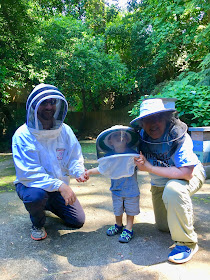Last summer I got an unexpected call.
"This is the location director for the new Spiderman movie and we need the help of a beekeeper. We are shooting some scenes for Spiderman in Piedmont Park and we need someone to keep the bees in the beehives over there!"
I said, "Well, I can't do that. I can't make the bees stay in the hive and besides I don't have access to the
bee hives in Piedmont Park."
He said, "We can't get in touch with the park's beekeeper. We'll pay you $20 to do this."
I laughed and told him that didn't begin to be enough money and besides, I couldn't make the bees stay in the beehive. He quickly raised it up to a lot of money and said he would pay me a minimum of four hours work a night for two nights. His biggest concern was that no one get stung - not Spiderman nor any of the many, many people working on the set. I said OK (if you get to a certain amount, I'll say yes to most anything!) and immediately called beekeeping buddies to get advice.
Piedmont Park is Atlanta's equivalent of Central Park. Many people daily walk right past these beehives so they are enclosed in a screened room with a locked door and open top. Here's how the beehives at Piedmont Park look:
I couldn't go inside the locked enclosure and simply cover the hives or block their entry for the night. And it's hot in July so many were bearding on the outside in the evenings. After getting good advice (mostly from Julia), I decided that what I should do is to cover the entire enclosure with wet sheets as one might cover just a single hive during a robbery. I gathered every sheet I had that wasn't on a bed (nine of them), put them in a bag and headed for the park.
The movie was being shot at night, but because they were making the area brightly lit with huge spotlights, the bees were likely to continue flying if only to fly toward the lights.
I got lots of help from many people (takes a ton of people to shoot a scene in Spiderman). We wet the sheets in a wheelbarrow.
Lots of equipment was assembled around the beehives. I couldn't believe how many people and items were needed to film Spiderman.
A water truck was nearby because they were planning to blow up a car near the beehives. This explosion was the main reason they were worried about the bees. This nice young man filled the wheelbarrow with water for me and pushed it to the beehives.
Then he and I climbed up this ladder and draped the hive enclosure with the wet sheets.
As we finished, it was really dark. The bees stayed safely inside the enclosure and the filming began. All of this took me about 15 minutes to carry the equipment from my car to the hives and about 30 minutes to cover the enclosure. Then I could sit and watch all of the process involved in filming.
Around 9 PM, they were ready to blow up the car, a mere 20 feet from the hives. The movie workers came over to me by the hives and requested that I move about 100 feet away to avoid being harmed by the explosion.
I went over and sat with other movie workers on golf carts while the filming was going on. Although I had been warned, when the car blew up, I must have jumped a foot into the air!
When I left at 10 PM, there was still lots of filming planned for the remainder of the night. I went home and returned very early the next morning to remove the sheets. In that process, I did get one sting from a bee who was tangled in the folds of the sheet and felt irritated by my interference to rescue her.
So Spiderman was filmed in Atlanta's Piedmont Park with no bee stings to Spidey or his supporters. The only single sting was mine the next day.
If you see the movie, when the car blows up, think of me!















